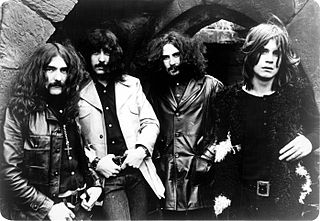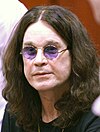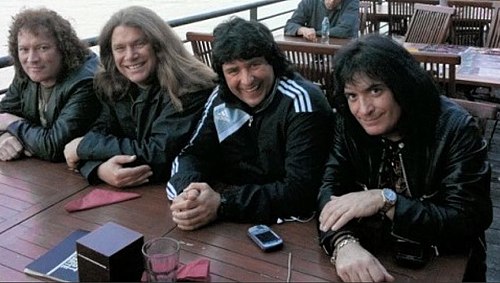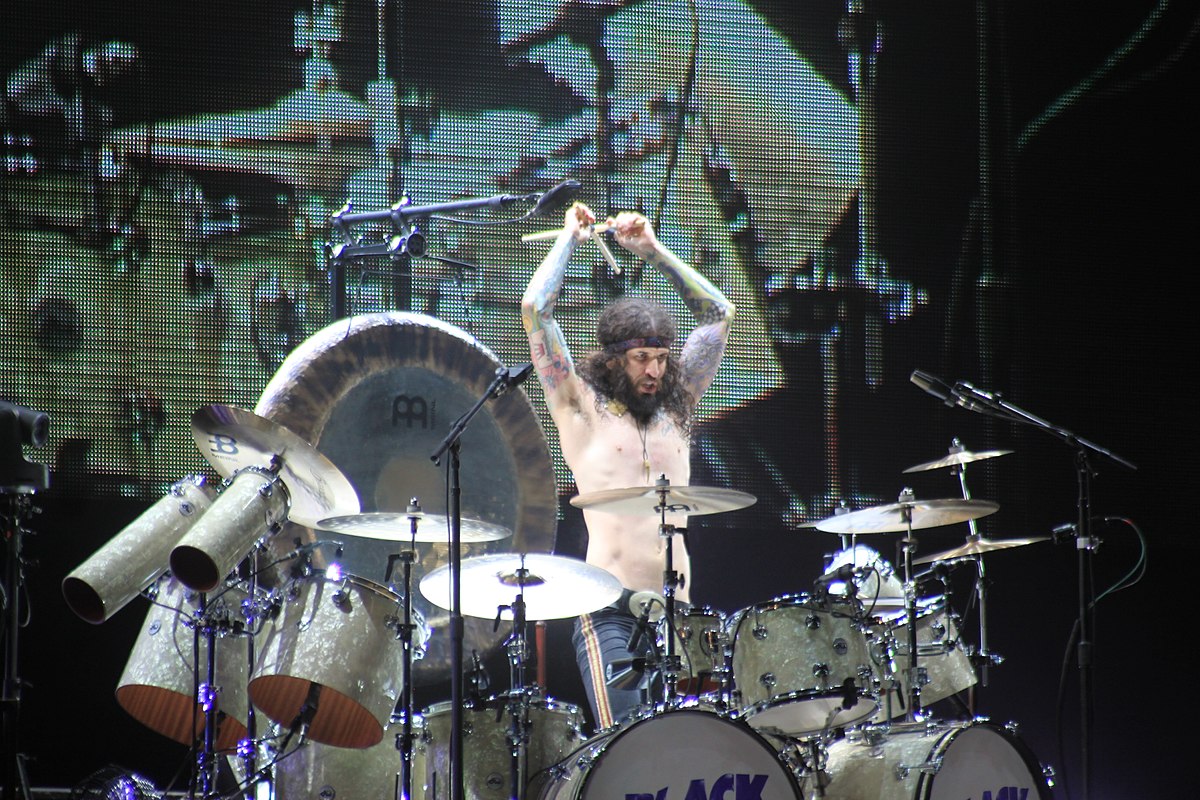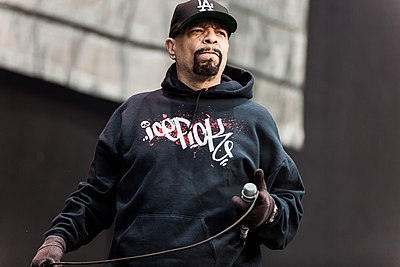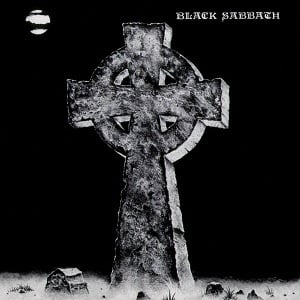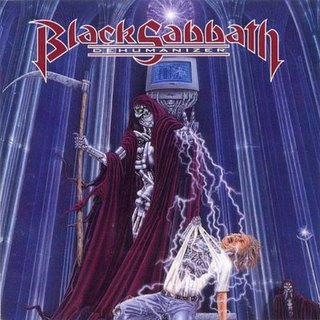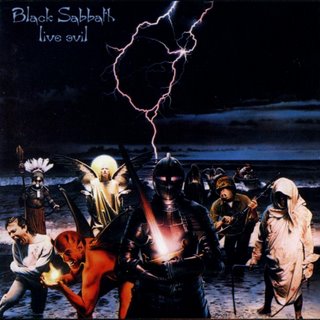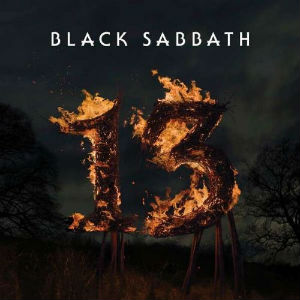History
1968–1985
Black Sabbath formed in 1968, taking members from two other local bands – guitarist Tony Iommi and drummer Bill Ward from Mythology, and vocalist Ozzy Osbourne and bassist Geezer Butler from Rare Breed. [1] Initially known as The Polka Tulk Blues Band, the group's name was changed in September 1968 to Earth, before they became Black Sabbath in August 1969 after being confused with another British act called of the same name. [2] After seven commercially and critically successful albums, Osbourne left abruptly in September 1977 to pursue a solo career. [3] He was replaced by Dave Walker, although by the following January he had returned to the band. [4] After one more album, Never Say Die! , Osbourne was fired on 27 April 1979, due to his reliance on alcohol and drugs, and his reluctance to work on a new album. [5]

Anthony Frank Iommi is an English guitarist, songwriter and producer. He was lead guitarist and one of the four founder members of the heavy metal band Black Sabbath. He was the band's primary composer and sole continual member for nearly five decades.

William Thomas Ward is an English musician and visual artist, best known as the original drummer of the British heavy metal band Black Sabbath. He also performed lead vocals on two Black Sabbath songs: "It's Alright" from the album Technical Ecstasy and "Swinging the Chain" from the album Never Say Die!.

Mythology were an English blues rock band based in Carlisle that formed in early 1967, out of The Square Chex. The band featured future Black Sabbath founder members Tony Iommi and Bill Ward.
Osbourne was replaced by former Rainbow vocalist Ronnie James Dio in June 1979. [6] Butler chose to leave shortly after his arrival, with Geoff Nicholls taking his place in mid-July before Dio's former bandmate Craig Gruber joined and Nicholls moved to rhythm guitar and keyboards (later keyboards only). [7] Recording began with Gruber, but Butler returned in November and performed all bass parts on Heaven and Hell . [8] Ward abruptly left partway through the album's promotional tour after a show on 19 August 1980, with Vinny Appice enlisted to take his place from 31 August. [9] In November 1982, after disagreements over the mixing of Live Evil , Dio and Appice left Black Sabbath and formed Dio together. [10] The following February, the band replaced Dio with former Deep Purple frontman Ian Gillan, and brought back original drummer Ward. [11]

Rainbow are a British rock supergroup led by guitarist Ritchie Blackmore, active from 1975 until 1984, 1993 until 1997, and 2015 until present. They were originally established with Ronnie James Dio's American rock band Elf, but after their first album, Blackmore fired the backing members and continued with Dio until 1979. Three British musicians joined in 1979—singer Graham Bonnet, keyboardist Don Airey and then-former Deep Purple bassist Roger Glover—and this line-up gave the band their commercial breakthrough with the single "Since You Been Gone". Over the years Rainbow went through many personnel changes, with each studio album recorded with a different lineup, and leaving Blackmore as the band's only constant member. The singers Joe Lynn Turner and Doogie White followed Bonnet, and numerous backing musicians have come and gone. In addition to Blackmore, Rainbow's current lineup includes Ronnie Romero on vocals, Jens Johansson on keyboards, Bob Nouveau on bass and David Keith on drums.

Ronald James Padavona known professionally as Ronnie James Dio or simply Dio, was an American heavy metal singer-songwriter and composer. He fronted or founded numerous groups throughout his career, including Elf, Rainbow, Black Sabbath, Dio, and Heaven & Hell.

Geoffrey James Nicholls was a British musician and keyboardist, and longtime member of the heavy metal band Black Sabbath, until 2004. Nicholls also played in the NWOBHM band Quartz, before joining Black Sabbath. In the 1960s/early 1970s, Geoff played lead guitar for the Birmingham bands The Boll Weevils, The Seed, Johnny Neal and the Starliners and keyboards for World Of Oz.
After recording Born Again , Ward was forced to leave again in the summer of 1983 due to his continuing problems with alcohol abuse. He was replaced for the Born Again Tour by Electric Light Orchestra drummer Bev Bevan. [12] Gillan departed after the tour. [13] He was briefly replaced by former Steeler vocalist Ron Keel, although this was short-lived due to disagreements between the band and their new producer Spencer Proffer, which saw plans for a new album fall through. [14] After Keel, a newly-sober Ward returned to the band and they briefly worked with David "Donut" Donato on vocals. However, this also failed to result in a new album or tour dates, Butler left in response to the personnel changes, and the band remained inactive until the following year. [13] Iommi subsequently began working on a planned solo album in early 1985. [13]

Born Again is the 11th studio album by English heavy metal band Black Sabbath, which was released in August of 1983. It is the only album the group recorded with lead vocalist Ian Gillan, best known for his work with Deep Purple. It was also the last Black Sabbath album for nine years to feature original bassist Geezer Butler, and the last to feature drummer Bill Ward until he played the studio tracks on their 1998 live album Reunion. The album has received mixed to negative reviews from critics, but it was a commercial success upon its 1983 release, reaching No. 4 in the UK charts. The album also hit the top 40 in the United States.

The Born Again Tour 1983 was a global concert tour by in support of Black Sabbath's Born Again album. Both the album and the tour were the only ones of Black Sabbath's to feature former Deep Purple frontman Ian Gillan on lead vocals. Ex-Electric Light Orchestra drummer Bev Bevan was hired to replace Bill Ward, who had returned to the band for the recording of the album after a two-year hiatus, for the tour. This was the final tour to feature original Black Sabbath bassist Geezer Butler until 1992's Dehumanizer tour.

The Electric Light Orchestra (ELO) are an English rock band formed in Birmingham in 1970 by songwriters/multi-instrumentalists Jeff Lynne and Roy Wood with drummer Bev Bevan. Their music is characterised by a fusion of Beatlesque pop, classical arrangements, and futuristic iconography. After Wood's departure in 1972, Lynne became the band's leader, arranging and producing every album while writing virtually all of their original material. For their initial tenure, Lynne, Bevan, and keyboardist Richard Tandy were the group's only consistent members.
1985–1997
For his planned solo album, Iommi began working with bassist Gordon Copley and drummer Eric Singer, then members of Lita Ford's backing band (Iommi's fiancée at the time). [15] After a few months, Copley returned to working with Ford, and Dave Spitz was brought in as his replacement. [16] On 13 July 1985, the original lineup of Black Sabbath reunited for a one-off appearance at Live Aid, performing the songs "Children of the Grave", "Iron Man" and "Paranoid". [17] Iommi then returned to working on his solo album, for which he enlisted former Trapeze and Deep Purple vocalist Glenn Hughes in July. [18] However, after pressure from his American record label Warner Bros. Records, Iommi was forced to credit Seventh Star to "Black Sabbath featuring Tony Iommi" upon its release in January 1986. [19]
Gordon Copley, born in Pasadena, California, is a bassist who briefly played bass for Black Sabbath. He played bass on the Black Sabbath song "No Stranger to Love" on their album Seventh Star. Bassist Dave Spitz played bass on the rest of the songs on the album. Copley was also the bassist for Lita Ford's band in early 1985 and joined her on tour after featuring on Seventh Star, leaving Sabbath. Copley would then later feature on Bill Ward's 1990 album Ward One: Along the Way.

Eric Singer is an American hard rock and heavy metal drummer, best known as a member of Kiss, portraying The Catman originally played by Peter Criss. He has also performed with artists such as Black Sabbath, Alice Cooper, Lita Ford, Badlands, and Gary Moore as well as his own band ESP. In his career, Singer has appeared on over 75 albums and 11 EPs.
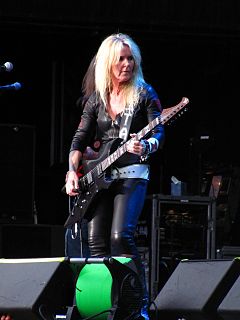
Lita Rossana Ford is an English-born American rock guitarist, actress, vocalist and songwriter who was the lead guitarist for the Runaways in the late 1970s before embarking on a solo career in the 1980s.
Returning on the Seventh Star Tour under the original moniker, the band were forced into another change of vocalist on 26 March 1986, when Hughes suffered an injury in a fight with manager John Downey which left him unable to sing. [20] [21] He was replaced by Ray Gillen, who debuted on 29 March. [22] During the production of their next album, The Eternal Idol , the lineup of Black Sabbath changed multiple times – first, Bob Daisley replaced Spitz on 30 September 1986, before leaving on 11 November after completing his bass parts; next, Singer left on 1 January 1987, with his drum parts completed; and finally, Tony Martin replaced Gillen on 1 March. [20] Around the time of Martin's arrival, Bevan also returned to the band. [23] Preparing for shows in July, the band briefly rehearsed with original bassist Butler, [20] although within a few days he had left again and Spitz was brought back in his place. [24] Bevan left after one show, objecting to upcoming dates at Sun City, South Africa, and was replaced for the shows by Terry Chimes. [23]
Raymond Arthur Gillen was an American rock singer-songwriter. He is a best known for his work with Badlands, in addition to his stint with Black Sabbath in the mid-1980s and recording most of the vocals on Phenomena's Dream Runner album.

The Eternal Idol is the 13th studio album by English rock band Black Sabbath, released on November 23, 1987. It is the first Black Sabbath album to feature vocalist Tony Martin. It spent six weeks on the Billboard 200 chart, peaking at 168. It was also the last full album of new material by Black Sabbath to be released by Warner Bros. Records, and the final album through their original label Vertigo Records until the release of 13 in 2013.
Robert John Daisley is an Australian musician, songwriter and author. Daisley is also known for contributing bass and lyrics for Ozzy Osbourne throughout the 1980s and 1990s he has also associated with Black Sabbath, Rainbow, Gary Moore and Uriah Heep.
Tony Martin joined in 1987, and went on to become the second longest-serving vocalist in the band's history.
After the Sun City shows, Spitz left the band again on 15 August 1987; he was later replaced by Jo Burt on 1 October. [24] Burt remained a member early the next year, [25] but had left by the time the band played a charity show on 29 May 1988, at which Nicholls filled in on bass. [24] By August, the band had started work on new album Headless Cross with bassist Laurence Cottle and drummer Cozy Powell. [26] Butler was slated to return for the subsequent touring cycle, but he ultimately joined Osbourne's solo band and instead Neil Murray was hired in May 1989. [27] [28] This lineup remained stable for more than a year, releasing Tyr in 1990 and touring until the end of the year. [29]
After the tour in promotion of Tyr, Butler returned to the band. [30] Despite rumours of an original reunion lineup, it was Dio who took over from Martin on vocals in January 1991. [29] Within a few months, however, Martin was reinstated after Dio and Iommi disagreed over the vocalist's desire to bring back Vinny Appice and reunite the Mob Rules lineup. [30] Dio eventually did return with Appice later in the year, and the lineup released Dehumanizer in 1992. [30] At the end of the resulting tour, however, Dio left after refusing to perform at two shows in November supporting original vocalist Osbourne, who had announced his retirement. Rob Halford, who had recently left Judas Priest, filled in for the dates. [31] After the original lineup reunited onstage at the second show for four songs, plans were set for a full reformation with Osbourne and Ward the next year. [32]
The reunion with Osbourne and Ward ultimately fell through, and in early 1993 the band brought back Martin as frontman. [33] With Appice also gone after the Dehumanizer Tour, the band auditioned drummers and hired Bobby Rondinelli in March. [34] Cross Purposes was released and promoted on a short concert tour in 1994, after which Butler left the band again. Rondinelli was replaced by Ward for the final leg of the tour in South America, but the drummer chose to leave again when Butler departed. [35] Butler and Ward were replaced by returning members Murray and Powell, respectively, marking a reunion of the Tyr lineup. [35] The band toured in promotion of new album Forbidden in 1995, although Powell was replaced by Rondinelli partway through the tour in August. [36] After the conclusion of the tour, Black Sabbath went on hiatus during 1996 as Iommi began work on a new solo album. [36]
1997–2017
In March 1997, the long-awaited reunion of Osbourne, Iommi and Butler was announced for the Ozzfest tour, starting in May. [37] Ward, however, was not invited to join; his place was instead taken by Faith No More drummer Mike Bordin. [38] For a rescheduled show on 1 July, Shannon Larkin of Godsmack took over from Bordin, who was unavailable. [39] Ward eventually returned in November for a pair of shows the following month, [40] which were recorded and released alongside two new studio tracks on Reunion in 1998. [41] A short European tour was scheduled for June 1998, however just before it began Ward suffered a minor heart attack. [42] Appice was brought in to replace him for the shows. [43] Ward returned later in the year, with a tour in support of Reunion taking place in 1999. [44] After another hiatus while members worked on solo projects, Sabbath joined Ozzfest again in 2001, although a later tour was cancelled when Osbourne was ordered by his label Epic Records to complete work on his new album Down to Earth . [45]
After another hiatus, Black Sabbath returned in 2004 with new touring keyboardist Adam Wakeman. [46] Halford reprised his role as substitute vocalist for a show on 26 August, after Osbourne was unable to sing due to bronchitis. [47] More tour dates followed in 2005, including another appearance on the Ozzfest tour, [48] before Iommi began working with Dio in early 2006 on new tracks for an upcoming compilation titled The Dio Years . [49] By October, the reunion had evolved into a full reformation of the Heaven and Hell lineup of the band (without Nicholls), with the moniker Heaven & Hell adopted accordingly. [50] During this time, the official lineup of Black Sabbath continued to be Osbourne, Iommi, Butler and Ward, as it was assured by representatives of the band that Heaven & Hell was a separate project. [51]
Heaven & Hell released one studio album, The Devil You Know , and remained active until Dio died of stomach cancer on 16 May 2010. [52] On 11 November 2011, the original lineup announced at a press conference that they would be reuniting for their first studio album since 1978, as well as an accompanying concert tour. [53] However, on 3 February 2012, Ward announced that he would not be joining his bandmates unless he received a "signable contract ... that reflects some dignity and respect toward me as an original member of the band". [54] The drummer confirmed his departure in May, after failing to reach an agreement that suited him. [55] Five days after the announcement, the band played their first live show since 2005 in Birmingham, with Tommy Clufetos – the drummer in Osbourne's solo band – in place of Ward. [56]
Former Rage Against the Machine and Audioslave drummer Brad Wilk was enlisted to perform on new album 13 , which was released in June 2013. [57] Clufetos remained for the album's promotional touring cycle. [58] On 3 September 2015, it was announced that the band would embark on a tour dubbed The End throughout 2016 and 2017, which would serve as their "farewell tour". [59] Another studio album was initially announced in 2014, however this was later scrapped. [60] The final studio recordings released by the band were four outtakes from the 13 sessions, which were issued alongside four live recordings on the EP The End in January 2016. [61] The final Black Sabbath show took place on 4 February 2017 at the Genting Arena in Birmingham, which was recorded for The End of the End documentary film and The End: Live in Birmingham album and video release. [62] [63] On 7 March 2017, Black Sabbath's disbandment was officially confirmed. [64]

